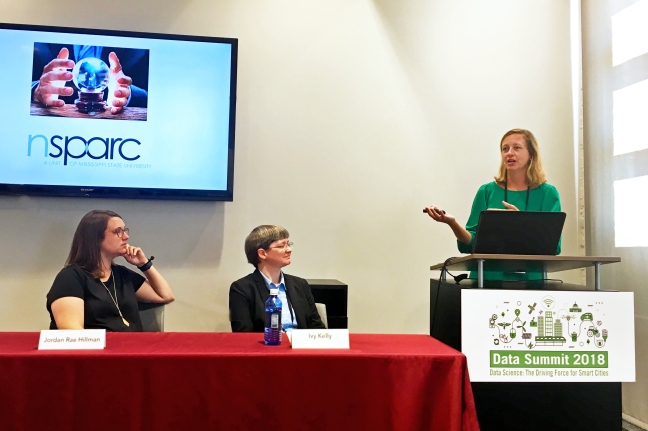STARKVILLE, Miss.—Carl Small Town Center director Leah Kemp was among the state, education, and industry leaders who examined the many uses of data to create “smart cities” during the third annual Data Summit, hosted by Mississippi State’s National Strategic Planning and Analysis Research Center (NSPARC).
Sessions at the two-day summit explored how data science can lead to new innovations and processes within the “smart city” concept across various industries, including agriculture, communication and media, education, energy, infrastructure, city planning, government, health, transportation and logistics, public safety, security and data governance.
Kemp and other design and planning experts on the Smart City Planning panel discussed how towns and cities around the world are moving toward a “smart city” framework. Kemp shared how the Carl Small Town Center successfully incorporated data analysis into their planning model for the Center’s Ripley Master Plan project.
“Working with NSPARC, the Carl Small Town Center was able to use economic development data to support our recommendations for the Ripley community,” Kemp said. “Being able to demonstrate how our project recommendations will create jobs and boost the local economy is critical to receiving buy-in from the communities in which we work.”
Mimmo Parisi, a professor of sociology, founded NSPARC 10 years ago and has overseen its growth. Earlier this year, NSPARC opened a data center in the Thad Cochran Research, Technology and Economic Development Park. The new center contains 3,300 square feet of state-of-the-art technology that can process and store more than 400 terabytes of data, allowing NSPARC to further its mission of using data science to drive human progress.
During his keynote speech, Parisi discussed the ways cities will use data to improve public life, something Mississippi has become well versed in. He said data has to be structured and used in a way that makes it practical for it to provide value.
“Data has to be big, smart and fast, otherwise it won’t have the same value,” Parisi said.
James Carskadon contributed to this article.

